AMD Radeon RX 7800 XT
Rated: 9.3/10
Nvidia GeForce RTX 4080
Rated: 9.6/10
Pros And Cons
| GPU | Pros | Cons |
|---|---|---|
| Nvidia GeForce RTX 4080 | ✅ 4K 120FPS gaming ✅ Incredible performance jump over predecessor | ❌ Higher power consumption ❌ Large and bulky |
| AMD Radeon RX 7800 XT | ✅ Better value at a lower cost ✅ Decent performance at 1440p and 4k | ❌ Lags in ray tracing and upscaling |
- During my evaluations of 4K gaming performance, the RTX 4080 surpassed the RX 7800 XT, offering a roughly 45% performance advantage.
- In terms of energy efficiency, the RX 7800 XT consumes approximately 7.7% less power compared to the RTX 4080.
- The RTX 4080 and the RX 7800 XT are still selling for almost the same prices they were originally listed at $1199 and $499, respectively.
- I recommend the RTX 4080 for high-end gaming and overall performance, and the RX 7800 XT for a more budget-friendly gaming experience.
Comparison Table
| Technical Specs | Nvidia GeForce RTX 4080 | AMD Radeon RX 7800 XT |
|---|---|---|
| GPU Chip | AD103 | Navi 32 |
| Architecture | Ada Lovelace | RDNA 3.0 |
| Shading Units | 9728 CUDA Cores | 3,840 Streaming Processors |
| RT Cores | 76 | 60 |
| ROPs | 112 | 96 |
| TDP | 320W | 263W |
| Best Variants | Best RTX 4080 graphics cards | Best RX 7800 XT graphics cards |
Architectural Differences
- Process Size: Nvidia uses cutting-edge 4nm processing nodes for its Ada Lovelace GPUs, whereas the RX 7800 XT employs a chipset design that uses 5nm and 6nm processing nodes to keep costs down and efficiency up.
- Clock Speed: The RTX 4080 has a base clock of around 2205MHz, much higher than the RX 7800 XT’s 1295 MHz. Their boost clocks are similar, with the RTX 4080 at around 2505 MHz and the RX 7800 XT slightly lower at 2430 MHz.
- VRAM: These cards have 256-bit 16GB of VRAM, but the RTX 4080 has faster memory using GDDR6X technology compared to the GDDR6 of the RX 7800 XT. The RTX 4080 also boasts a memory bandwidth of 716GB/s, outclassing the RX 7800 XT’s 620GB/s.
- TDP: The RTX 4080 is rated to consume up to 320 watts of power, which is low for such a high-end card. The RX 7800 XT undercuts this further with a TDP of only 263 watts.
- Other Features: In terms of nice-to-have features, Nvidia takes the cake. It has better ray tracing, better-looking image upscaling, ray reconstruction, and frame generation.
The RX 7800 XT has a great price-to-performance ratio, unlike Nvidia’s RTX 4080, which packs as much power as possible without regard for the hole in the consumer’s wallet it will leave. This comparison will pin the RX 7800 XT vs RTX 4080 against each other to see if either approach holds any water against the other.
Gaming Benchmarks
To assess the performance difference between the RX 7800 XT vs RTX 4080, we tested the gaming performance of these GPUs to gain deeper insights into their capabilities. We played taxing games at 4k resolution with close to Ultra settings in all games.
Test Bench
- OS: Windows 11
- CPU: Intel Core i7-13700K
- Motherboards: MSI MEG Z790 ACE MAX
- RAM: XPG Lancer RGB 32GB 7200MHz DDR5 Ram
- SSD: Teamgroup T-Force Z540 2TB Gen5 NVMe SSD
- PSU: Enermax Revolution D.F. X 1050W
- CPU Cooler: MSI MAG CORELIQUID E360 CPU Liquid Cooler
A Plague Tale Requiem
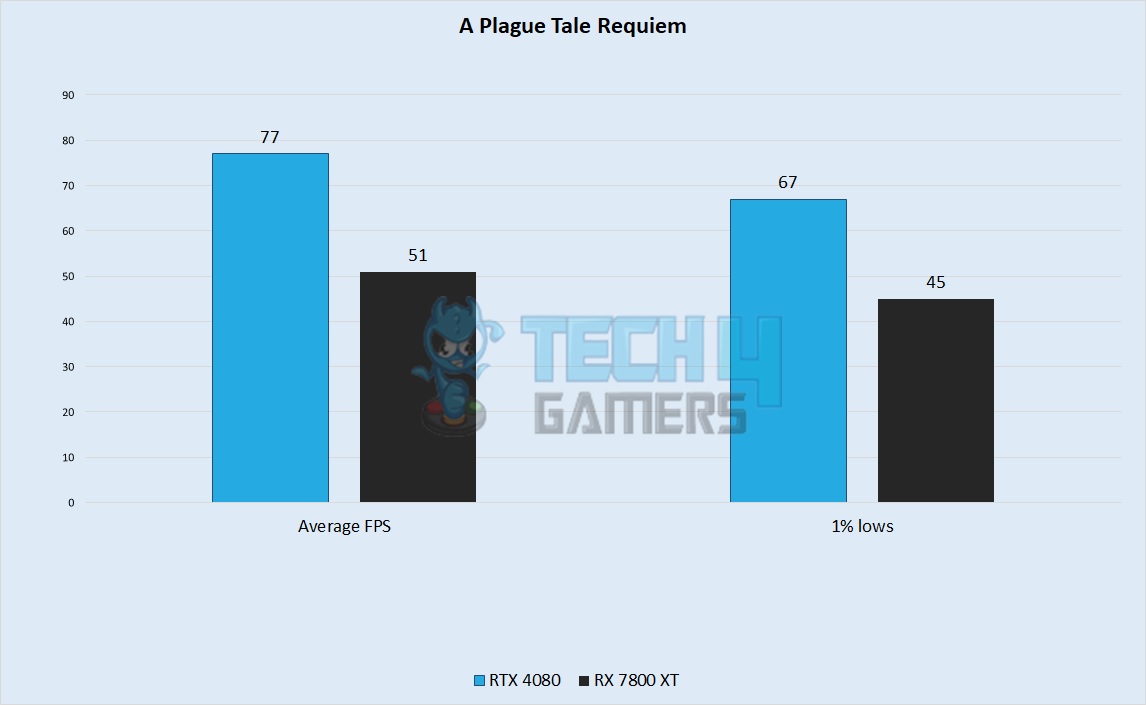
- Kicking things off with A Plague Tale Requiem, we saw that the RTX 4080 quickly eliminated the RX 7800 XT with a 50% lead. The RTX 4080 had a 77 FPS average, whereas the RX 7800 XT managed only to reach an average framerate of 51 FPS.
- In terms of low 1%, the RX 7800 XT maintained around 45 FPS. In contrast, the RTX 4080 was comfortably cruising over with 67 FPS.
Resident Evil 4
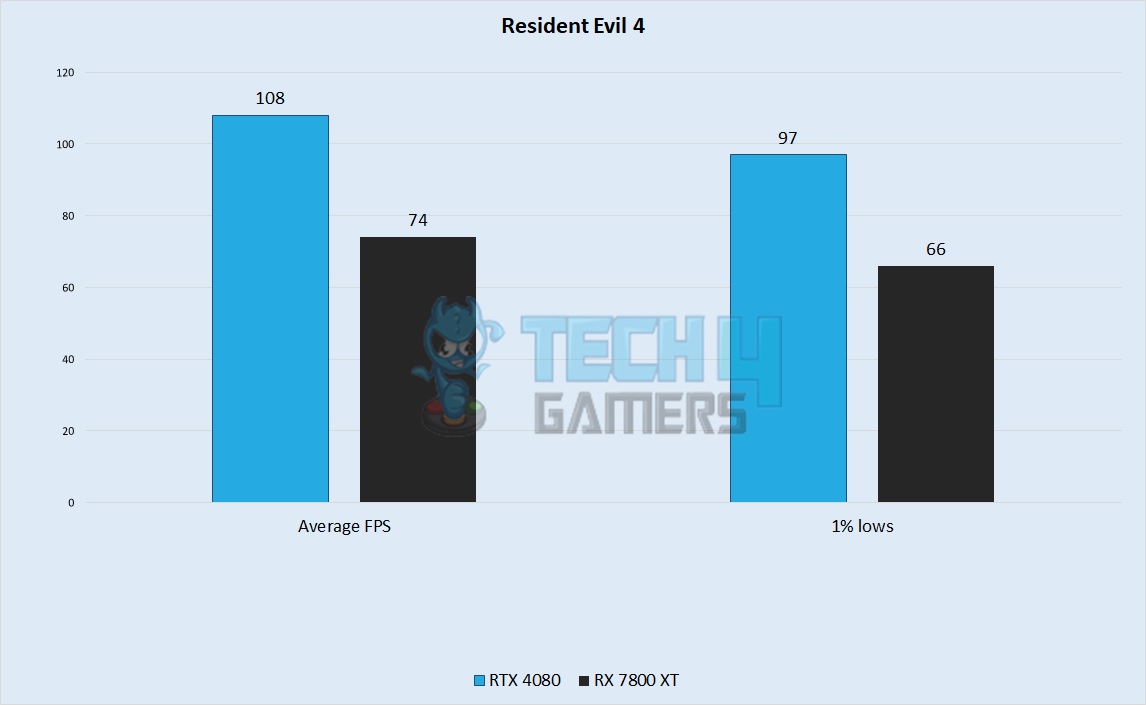
- During Resident Evil 4, the RX 7800 XT got an average framerate of 74 FPS, whereas the RTX 4080 managed an average of 108 FPS. This computed out to the RTX 4080 being 45% more performant in this game.
- 1% lows deviated similarly between the two cards as their average framerates, with the RX 7800 XT getting around 66 FPS, whereas the RTX 4080 stuttered down to around 97 FPS when there was a lot of action on-screen.
Cyberpunk 2077
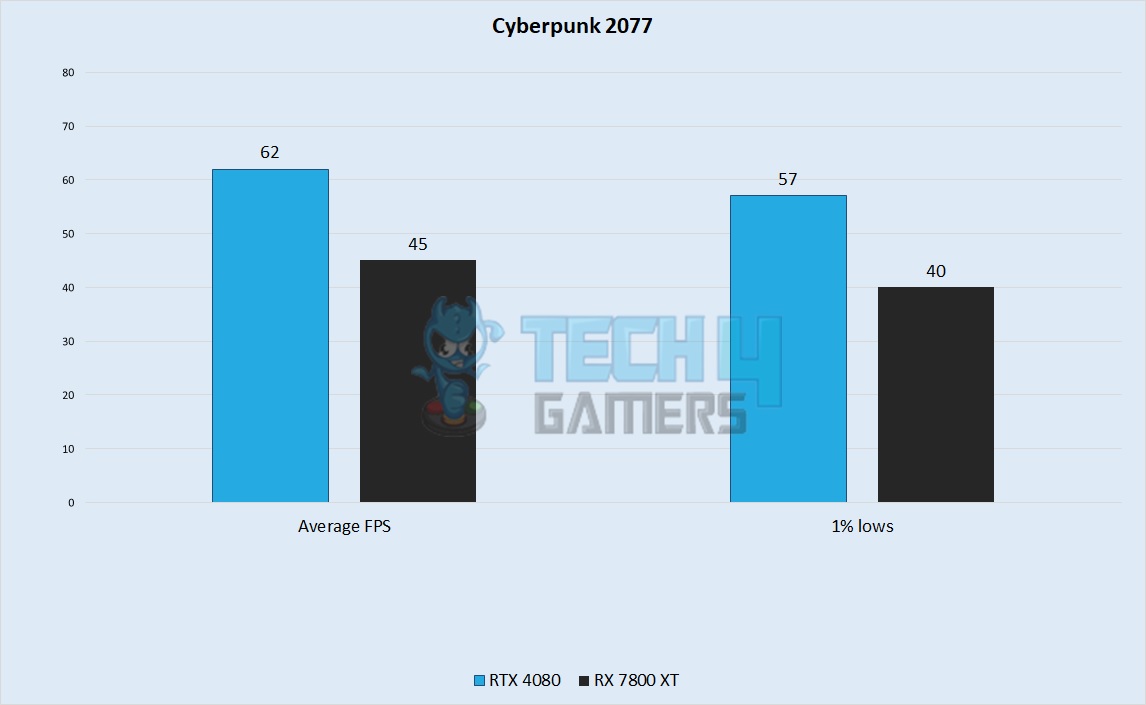
- In our Cyberpunk 2077 session, the RX 7800 XT had an average framerate of 45 FPS, whereas the RTX 4080 had a framerate of around 62 FPS, meaning that the gap in performance was reduced to around 38% in this game.
- Despite the low average framerates of these cards, the 1% lows did not fall far from the tree. The RTX 4080 got down to 57 FPS when the intensity was dialled up, whereas the RX 7800 XT got down to around 40 FPS.
Hogwarts Legacy
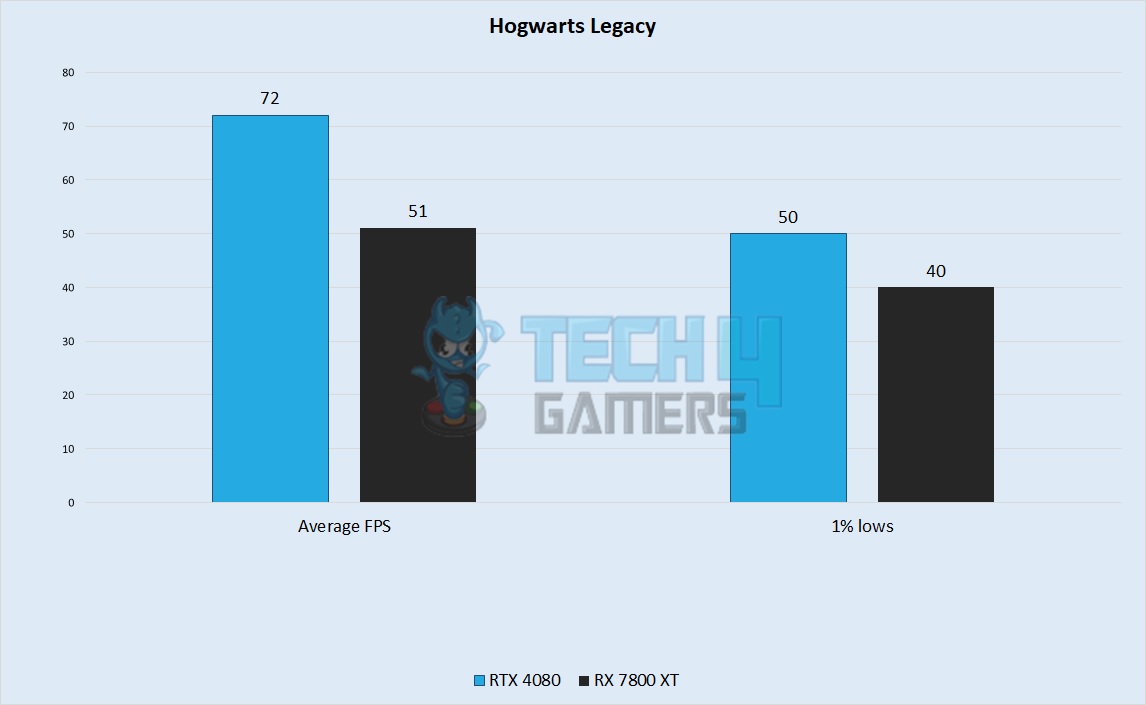
- The RTX 4080 regained its substantial lead in our Hogwarts Legacy gameplay by delivering 41% higher performance. The RX 7800 XT averaged 51 FPS on the ultra preset, while the RTX 4080 performed better at 72 FPS.
- In the worst 1% performance time, the RTX 4080’s performance got bumped down to as low as 50 FPS. The RX 7800 XT was not immune to this either, getting a minimum framerate of around 40 FPS.
Forza Horizon 5
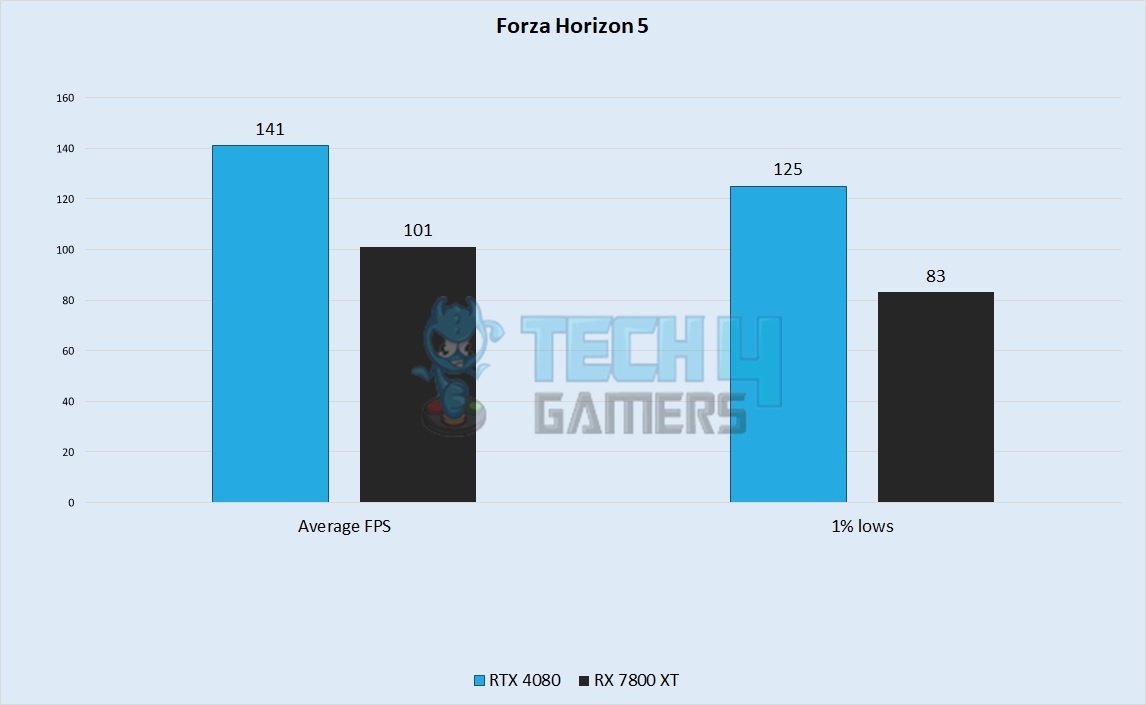
- We saw a pretty large 40% advantage for the RTX 4080 in Forza Horizon 5. The RTX 4080 had an average framerate of 141 FPS, whereas the RX 7800 XT was a much lower yet smooth 101 FPS average.
- The RTX 4080 did not experience large dips in performance, with the framerate dropping to 125 FPS at times, whereas the RX 7800 XT’s 1% lows felt more jarring, with the framerate dropping to around 83 FPS.
Marvel’s Spiderman Remastered
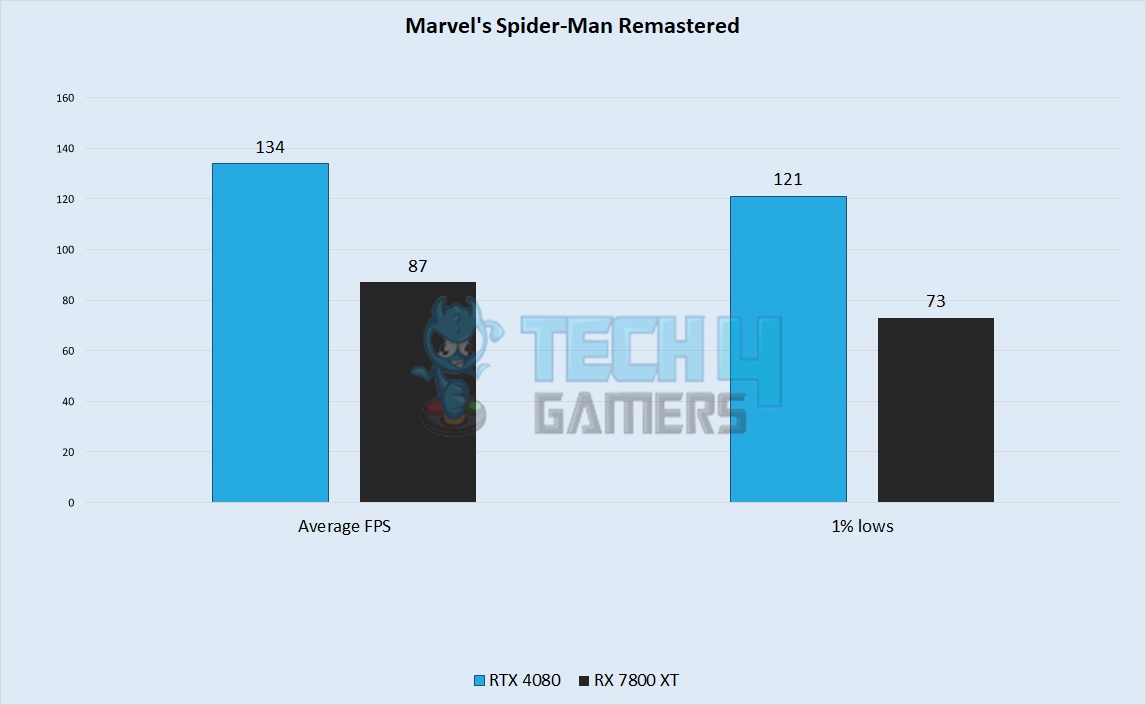
- The RTX 4080 outperformed the RX 7800 XT by 54% in Marvel’s Spiderman Remastered. The former had a framerate of around 134 FPS on average, whereas the latter got around 87 FPS.
- Regarding low 1% performance, the RTX 4080 reached around 121 FPS when scenes got hard to render, whereas the RX 7800 XT dipped to 73 FPS.
The Last Of Us
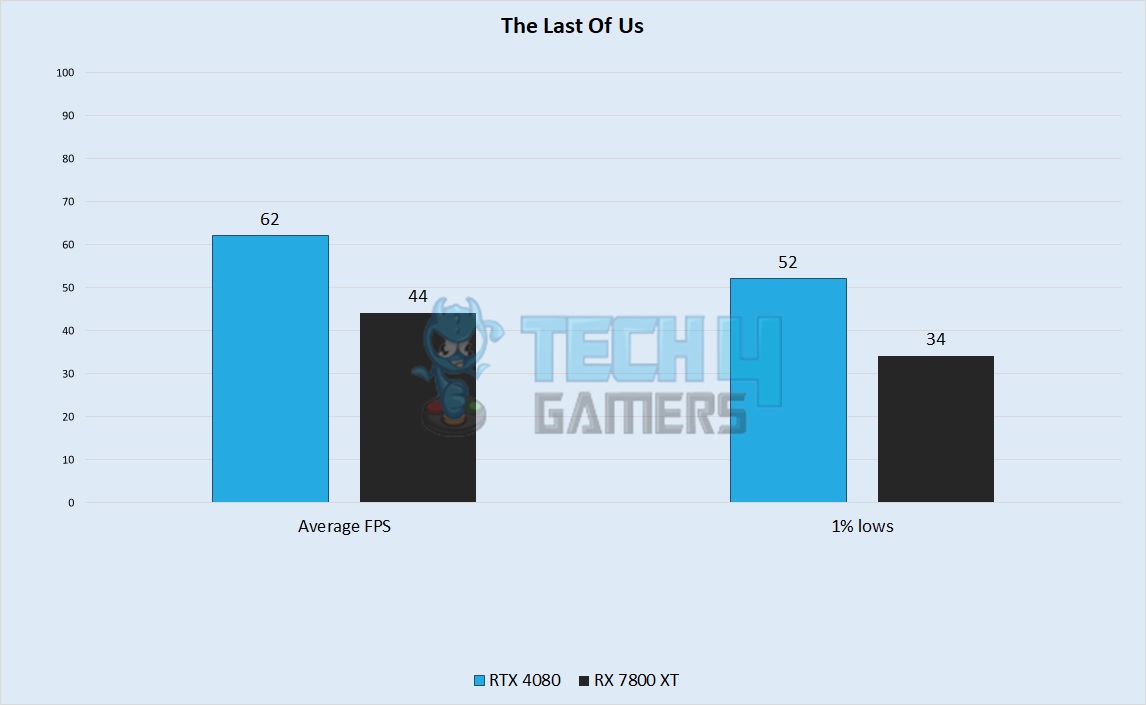
- Finally, for our last game, we tested The Last Of Us with the settings all the way up. The RTX 4080 got around 62 FPS, whereas the RX 7800 XT hovered around 44 FPS. This difference is around 41%.
- 1% lows dropped ten frames from the average of both cards, with the RTX 4080 getting lows of 52 FPS, whereas the RX 7800 XT got around 34 FPS.
Overall Gaming Analysis
Performance
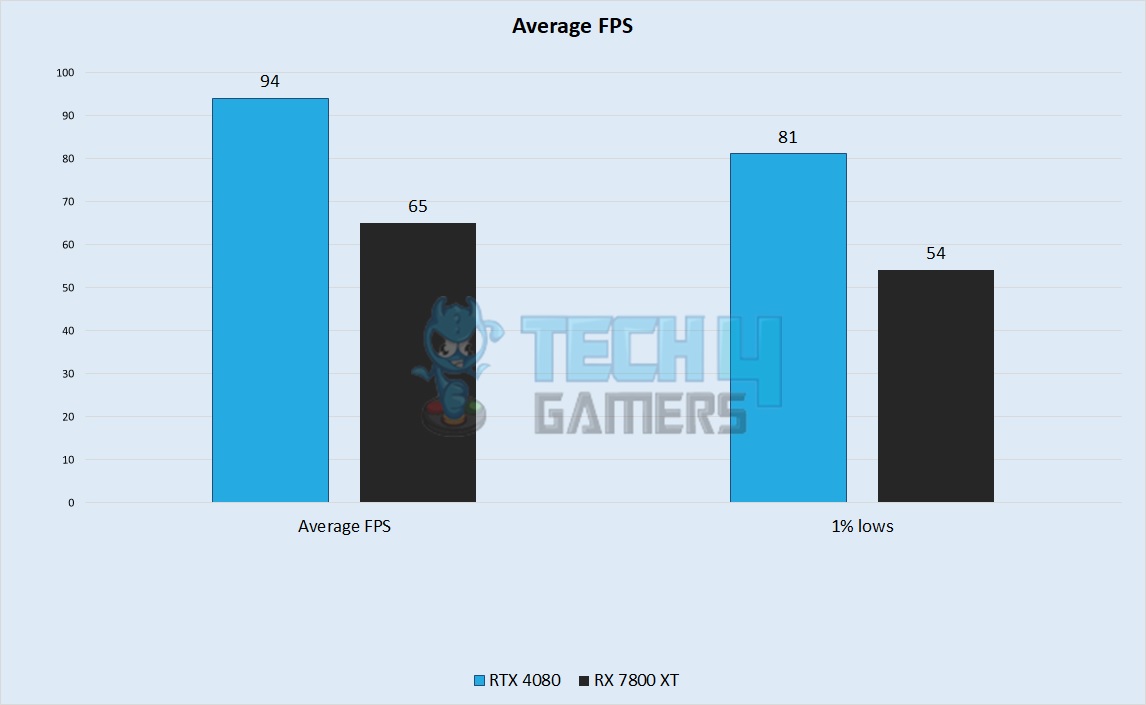
Our gaming tests at 4k showed the RTX 4080 to be around 45% faster than the RX 7800 XT in terms of average framerates. Over seven games, the RX 7800 XT had an average framerate of around 65 FPS, whereas the RTX 4080 had an average framerate of 94 FPS.
During low 1% performance times, the RTX 4080 lowered its framerate to around 81 FPS in action-heavy scenes on average, whereas the RX 7800 XT plummeted to around 54 FPS when rendering got tough. So, the low 1% performance of the RTX 4080 is about 50% better than the RX 7800 XT.
Winner: GeForce RTX 4080
Power Consumption
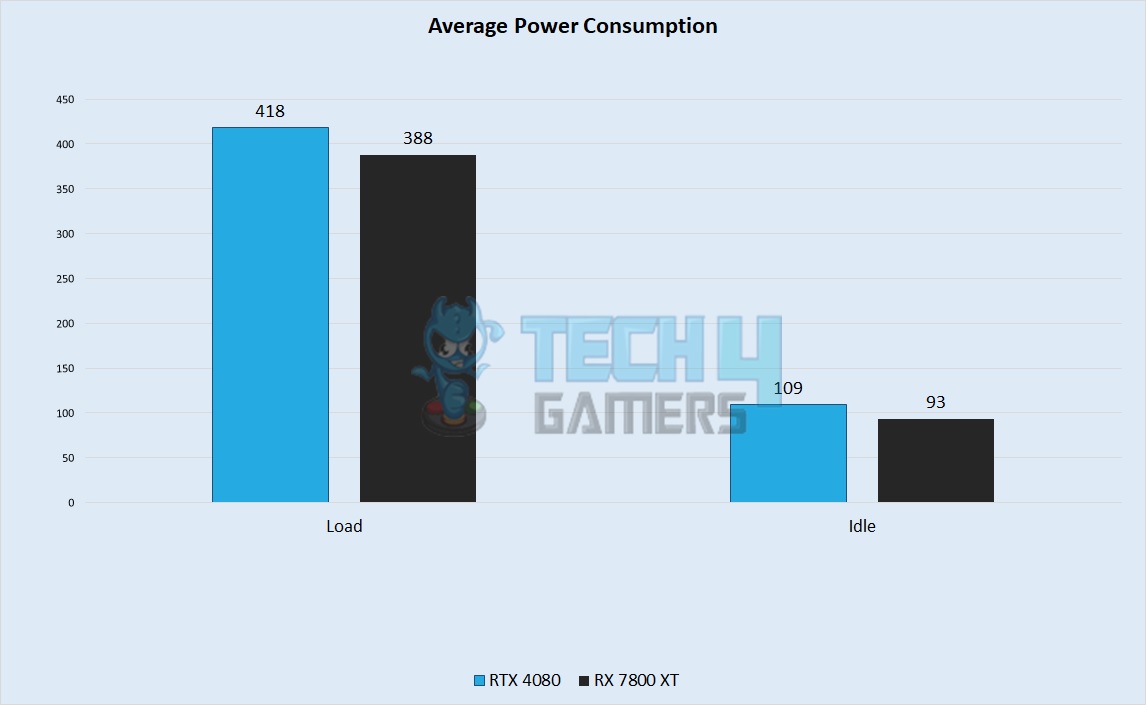
Our test bench had a system power consumption of around 418 watts under load with the RTX 4080, while around 388 watts on the system with the RX 7800 XT. So, the RX 7800 XT is about 7.7% more power efficient.
When comparing idle power consumption, the RX 7800 XT consumed 93 watts, whereas the RTX 4080 consumed 109 watts. Therefore, the RX 7800 XT demonstrates approximately 17.2% greater power efficiency at idle.
Winner: Radeon RX 7800 XT
Price And Availability
| GPU | Launch MSRP | Current Price |
|---|---|---|
| Nvidia GeForce RTX 4080 | 💲1199 | 💲1149 |
| AMD Radeon RX 7800 XT | 💲499 | 💲499 |
| Price Difference | 140% | 130% |
The current prices of these GPUs show a difference of approximately 130%, with a performance variance of around 45% to 50%. Additionally, the RX 7800 XT is notably more energy efficient. Consequently, the RX 7800 XT offers better overall value.
Final Verdict – What Do I Recommend?
GeForce RTX 4080: The RTX 4080 stands out as the top performer among its peers. In our tests, it consistently outperformed the competition by approximately 45%, making it an excellent choice for a smooth 4K gaming experience with high refresh rates. The ray tracing performance of the RTX 4080 is also much better than the RX 7800 XT.
Radeon RX 7800 XT: The RX 7800 XT is a very good mid-range efficient GPU from AMD, offering outstanding performance optimized for gaming at 1080p and 1440p resolutions. Moreover, its generous 16GB GDDR6 memory substantially boosts its overall value.
By day’s end, if you seek peak GPU performance without budget constraints, I suggest the RTX 4080. Yet, for a cost-effective GPU, the RX 7800 XT is a superb choice.
Frequently Asked Questions
AMD has announced their competitor to Nvidia’s generation named Fluid Motion Frames. It will be available to all GPUs (AMD and Nvidia) and will be released around Q1 2024.
The RX 7800 XT was released 10 months after the RTX 4080, but both graphics cards are part of the same generation.
The higher VRAM requirements of modern games might seem like it’s going exponentially, but it’ll take quite a while for the minimum requirement to double.
More From RTX 4080:
More From RX 7800 XT:
Thank you! Please share your positive feedback. 🔋
How could we improve this post? Please Help us. 😔
[Comparisons Expert]
Abdemanaf is a skilled creative writer who has been honing his craft since 2011. While initially working in different fields, he found a passion for technology and has been exploring the tech world since early 2015. Over the years, he has developed an in-depth knowledge of the latest tech trends and product offerings by various companies.
Abdemanaf’s writing reflects his analytical mindset and ability to think critically. He has a knack for breaking down complex technical information into easily digestible pieces, making his articles engaging and accessible to readers from all backgrounds. In February 2022, he joined Tech4Gamers as a blog and product comparison writer, where he has been able to hone his skills further.
As a writer, Abdemanaf is dedicated to staying up-to-date with the latest technological advancements and trends, enabling him to provide readers with the most relevant and accurate information. He is always eager to learn more and is constantly seeking new challenges to improve his skills.
Get In Touch: manaf@tech4gamers.com


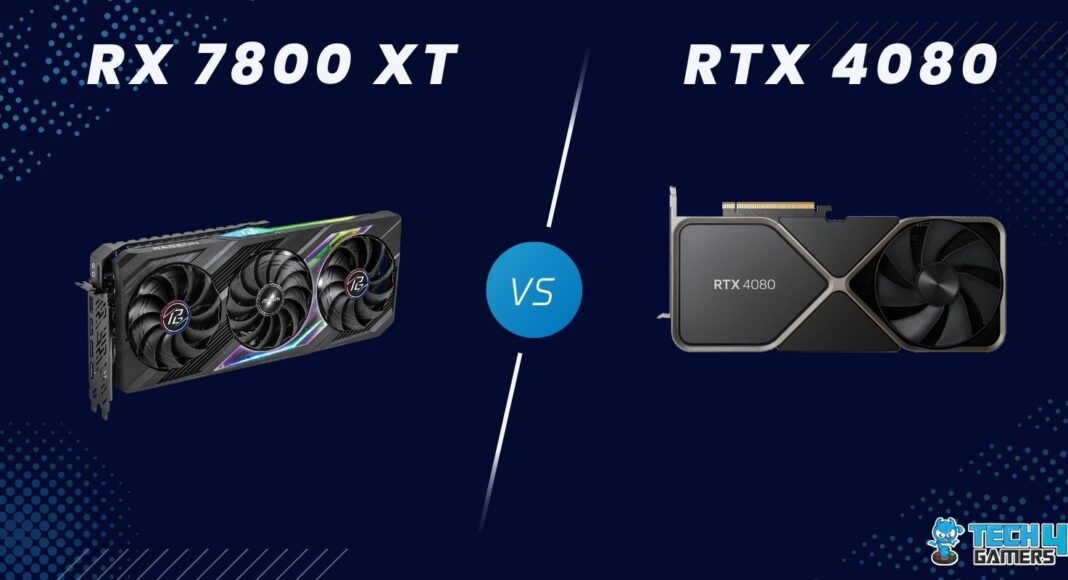

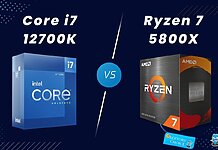
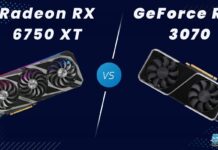
![RTX 4080 Super vs RTX 4090: Worth Upgrading? [Tested]](https://tech4gamers.com/wp-content/uploads/2024/02/RTX-4090-vs-RTX-4080-Super-218x150.jpg)
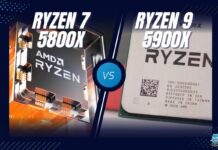
Feedback By:
Henry
Thomas
Anderson
Mia
Ava
Elijah
Johnson
Oliver